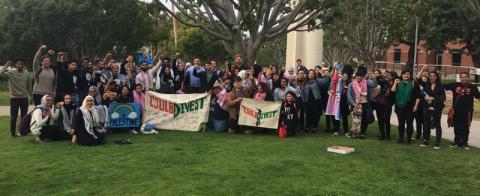The student government of California State University, Long Beach passed a resolution earlier this month calling on the administration to pull its investments in companies profiting from Israel’s violations of Palestinian rights.
The vote comes in spite of strong pressure on student senators by the university’s president to reject the resolution.
Meanwhile, students in Wisconsin also passed a resolution standing up to the US-based weapons and policing industries that profit from Israel’s human rights violations.
In the weeks leading up to the successful vote at Cal State Long Beach, Jane Conoley, the university’s president, echoed Israel lobby claims that the Palestinian-led boycott, divestment and sanctions (BDS) movement is to blame for an increase in anti-Semitism.
In a letter addressed to the student senators in late April, Conoley claimed that the passage of divestment resolutions “has often been accompanied by increases in anti-Jewish graffiti.”
Her letter repeats a common false and anti-Semitic trope used by Israel lobby organizations to stifle debate: that Jews – conflated as a monolith with the state of Israel – are being singled out by Palestinian rights campaigners for special scrutiny.
“Why are only Jews picked out for condemnation? It’s worth reflecting, I think, on implicit bias when singling out only one group of people for sanctions,” Conoley remarked, adding that BDS “has no actual impact on the very complex and long standing conflicts in the Middle East.”
False claims
The movement, spearheaded by the Palestinian BDS National Committee (BNC), aims to hold accountable institutions and companies complicit in the Israeli state’s denial of Palestinian rights. The BNC is explicit in its condemnation of all forms of racism and bigotry including Islamophobia and anti-Semitism.
“The false accusations from Cal State’s president come straight from the Israel advocacy playbook on suppression,” Palestine Legal attorney Liz Jackson remarked in a press release.
Palestine Legal and California Scholars for Academic Freedom warned Conoley that such baseless claims inflame speech suppression on campus.
“Your assertion that divestment increases anti-Jewish hate is unfounded and dangerous,” Palestine Legal stated. “You do not offer a single citation or other evidence to support this assertion, despite your claim to have engaged in a ‘careful study of the BDS movement.’”
Threats against Muslims
In contrast, Conoley has ignored recent threats to Muslim students on campus, Palestine Legal remarked.
In early April, “graffiti threatening ‘We will kill all Muslims on Friday’ was discovered on campus,” Palestine Legal stated, but administrators said nothing about it and did not warn the community.
“The death threat was especially alarming, given that the campus Muslim community prays together in a public place on Fridays,” Palestine legal said.
As interim president of the University of California at Riverside in 2013, Conoley reassured Israel supporters that a recently passed divestment vote by students there would not have an effect on ongoing US support for Israel.
Human rights defenders including the American Friends Service Committee, Jewish Voice for Peace and Students for Justice in Palestine at nearby UCLA wrote letters of support to student senators, urging them not to cave in to Conoley’s pressure.
California State University Long Beach is the second university in the state system to pass a resolution, behind San Jose State’s successful vote in 2015.
Also in southern California on 10 May, students at the University of California, Santa Barbara failed to pass a divestment resolution.
Students have attempted to pass a resolution at that campus over the last several years, and say they will continue the fight for divestment.
Eight out of the nine undergraduate campuses of the University of California system have already passed divestment resolutions, including UC Merced, which passed a resolution in April 2016.
Students resist US-Israeli police exchanges
Meanwhile, the undergraduate student government at the University of Wisconsin-Madison voted unanimously last month to back a broad-based resolution that calls for the university to drop its ties to companies that profit from mass incarceration, theft of indigenous land, police violence, the US-Mexico border wall, economic injustices against people of color and Israel’s human rights abuses in Palestine.
A previous version of the resolution was met with opposition, according to Omer Arain of Students for Justice in Palestine and a member of the student council.
Arain told The Electronic Intifada that activists worked hard to identify collective liberation struggles with which students are involved.
Sheriffs in Madison’s Dane County, Arain said, have participated in trainings by the Jewish Institute for National Security Affairs (JINSA), a neoconservative think tank that claims to have organized Israeli training sessions for thousands of law enforcement officials since 2004.
The resolution states that US-Israeli police exchanges “have actively contributed to the militarization of police forces” and the “extrajudicial killings of Black and Brown” people.
Last year, Dane County sent deputies to Standing Rock in North Dakota to quell protests by indigenous communities against a planned oil pipeline.
“I’m really proud that [the resolution] highlights the intersectionalities of all of these struggles,” Arain said.
In response to the passage of the resolution, administrators insisted the university had no association with the student government and would not support “the concept of BDS and academic boycotts,” claiming they marginalized Jewish students.
“This university doesn’t care what students of color are saying; they won’t even have a sit-down conversation about what was demanded by the student government, unanimously,” Arain said.
The resolution follows the lead of unionized graduate teaching assistants at the University of Wisconsin-Madison who voted to back BDS a year ago.
Nora Barrows-Friedman is a staff writer and associate editor at The Electronic Intifada, and is the author of In Our Power: US Students Organize for Justice in Palestine (Just World Books, 2014).


Spread the word